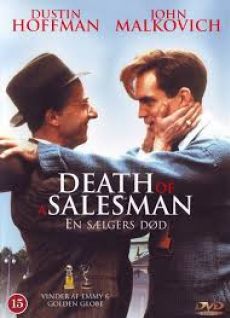
At Willy’s funeral Charley offers Linda his arm and commends Willy Loman, blaming not the fool but the capitalist world for the salesman’s untimely end; “It’s a rough world Linda. They wouldn’t blame him… No man only needs a little salary.” Charley highly commends Willy’s life of dreams in the face of the unrelenting profession he chose for himself, “A salesman is got to dream, boy. It comes with the territory.” In the end of the play Miller creates a strong sense of family life and the comfort it can provide. Biff, for example, having broken free of the delusions holding him back, pities Willy and refers to him as a “fine troubled prince” who has lost his way. Furthermore, in the restaurant Biff attempts to lift the disheartened “prince” from his delusional slumber and up above the surface to face the real world and the truth. Biff’s self realisation creates a sense of hope and a fresh start for the new cycle of life now that Willy has passed on and though Biff casts a “hopeless glance at Happy”, Miller seems to suggest that he will be the saviour of the Lomans. This positive interpretation of family is somehow less convincing than a negative portrayal when you consider that the boys are prepared to abandon their near senile father in public and disown him to impress some prostitutes.
Ultimately the end of the play is tragic, Willy is dead and Linda and Happy struggle still to break his delusion, as Linda worriedly asks at the funeral, “Why did no one come? He was well liked.” The ending is a bleak and solemn one; a spiritual, almost tranquil mood is created by the slow melodic flute playing in the background of The Requiem scene and there is a certain aura of hopelessness descending on Linda and Happy. Furthermore, I earlier explored the idea of family as a positive virtue in the play but like most key elements of the play, it is highly ambiguous. Biff’s self realisation brings with it an outburst at his family in a wild attempt to break their delusion; “We never once told the truth in this house!” The salesman appears passionate in his business as he uses very aggressive language earlier in the play whilst deluding over his ability in the business world, boasting of how he “Knocked ‘em cold in Providence” and “Slaughtered ‘em in Boston”. Such language only further reinforces Miller’s portrayal of the brutal and ruthless business world, evident when Willy is fired shortly before his suicide. Having worked 35 years at the company he is left bewildered and resentful to the point that he is driven, literally, to his untimely end. It is hard to squeeze any shred of positivity from this grim ending in the story of a man with sky high dreams but who quite frankly never left the sidewalk.
In light of the arguments expressed, it is apparent to see that family bonding in overcoming grief and a chance for new life to bloom in the Sun, free from the twisted shadow of delusion are positive aspects to take from the ending of Death of a Salesman. However, ultimately the salesman dies; Willy Loman’s life was all one big fantasy that never quite worked out. Miller compared Willy’s fruitless death to that of Lear; “Lear is unredeemed; he really goes down in a sack, in a coal chute. Hamlet has relief, moral relief so to speak; there is structure remaining.” The point Miller makes is that, unlike some tragic heroes such as Hamlet who fulfilled his role as a revenger shortly prior to his untimely death, Willy Loman achieved little to nothing of his dreams and goals in life and so, similarly to Lear, “he really goes down in a sack, in a coal chute.” There are limited positive aspects to take from the ending but as a whole the play is bleak and Linda’s positioning over Willy’s grave in The Requiem, at the front of the arc in the stage, is perhaps very significant as she casts a gazing eye over the audience, warning them of the fate that delusion can bring with it. Indeed the play does encourage one to question their morals and aims in life and I would argue that the ending of Death of a Salesman is overwhelmingly negative.

0 Comment:
Be the first one to comment on this article.